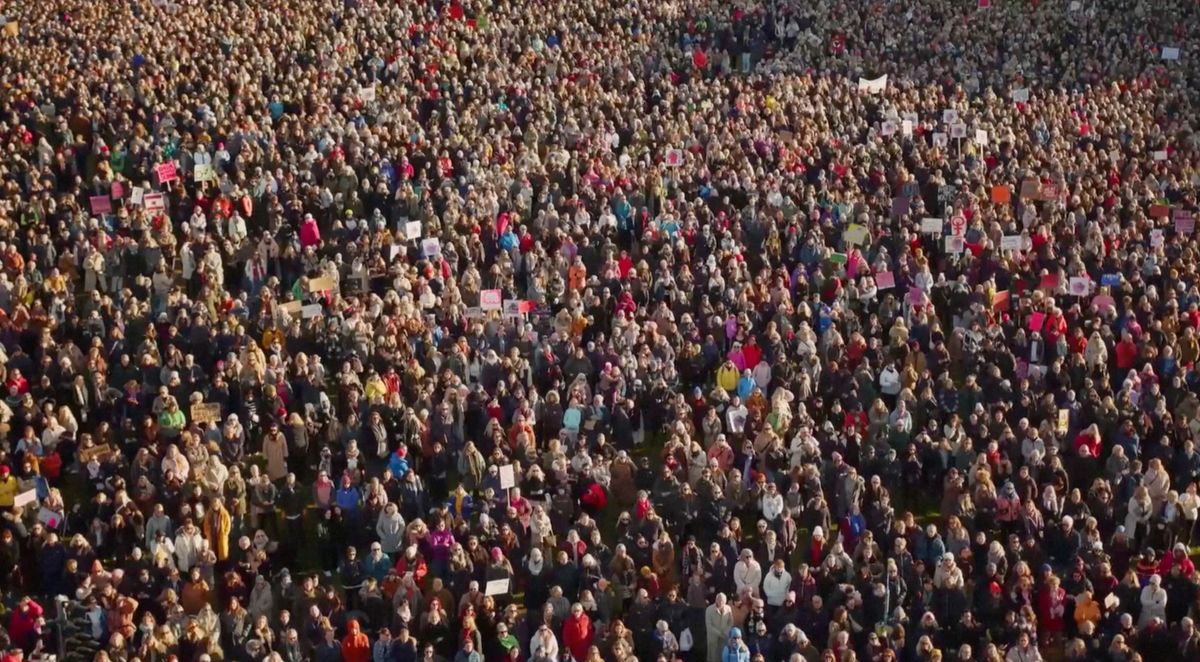Women strike across Iceland for gender equality
On Tuesday, women and nonbinary Icelanders went on strike from paying and non-paying jobs under the slogan “Do you call this equality?”

A few minutes every morning is all you need.
Stay up to date on the world's Headlines and Human Stories. It's fun, it's factual, it's fluff-free.
The backstory: Back in 1975, women across Iceland made history by holding a national strike for gender equality, causing schools and theaters to close and the national airline to cancel flights. Iceland is today considered a model for gender equality across the world, making it to the top of the World Economic Forum's (WEF) gender gap index for the past 14 years in a row. In fact, the country also had the first democratically-elected female president in the world. Vigdís Finnbogadóttir served for 16 years, also making her the longest-serving elected female head of state in history. But, just because Iceland has been deemed the most equal, that doesn’t make it entirely equal.
Iceland has reportedly closed 91.2% of its gender gap based on the WEF index. Still, according to Statistics Iceland, women in the country have median incomes earning about 21% less money than men on average. One explanation for this is that female-led and dominated fields and services can be undervalued, paying less. Women also tend to take on more household duties, which they aren’t compensated for.
Plus, there are other areas of gender-based issues in the nation that still need to be addressed. Based on a 2018 study from the University of Iceland, about a quarter of women reported having been raped or experiencing sexual violence at some point in their lives, and the same percentage experienced physical violence.
More recently: Progress is still being made in Iceland. In 2018, it launched a law making companies and government agencies start proving that they were paying both genders equally. But even with strides like this, pay parity scores have slipped, decreasing since 2021 to scores closer to where they were in 2017.
The development: On Tuesday, women and nonbinary Icelanders went on strike from paying and non-paying jobs under the slogan “Do you call this equality?” This is the first full-day strike for Icelandic women in almost five decades, with tens of thousands participating. Organized by 45 unions and other organizations, people all over the country took the day off to protest gender inequality. It’s also meant to bring attention to gender-based violence.
Prime Minister Katrin Jakobsdottir also decided to participate. She said that she expects women in her cabinet to strike, too. Women and nonbinary people were encouraged to pause all work, including household chores and childcare. Emergency health services are still fully running, but not other, less urgent forms of health care. The organizers also threatened to publish the list of companies and institutions reported by women that have discouraged employees from joining the strike.
Key comments:
"We're seeking to bring attention to the fact that we're called an equality paradise, but there are still gender disparities and urgent need for action," said Freyja Steingrímsdóttir, the communications director for the Icelandic Federation for Public Workers, who helped organize the strike.
“It isn’t women’s choice to work fewer hours than men,” said Sonja Ýr Thorbergsdottir, who runs the public sector federation of labor unions BSRB. “It’s because they do more unpaid work [in the home].”
“As you know, we have not yet reached our goals of full gender equality, and we are still tackling the gender-based wage gap, which is unacceptable in 2023,” Prime Minister Katrín Jakobsdóttir said. “We are still tackling gender-based violence, which has been a priority for my government to tackle.”




Comments ()